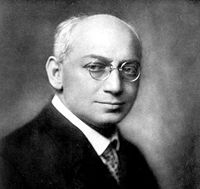Sándor Ferenczi
| Sándor Ferenczi | |
|---|---|
 |
|
| Born |
7 July 1873 Miskolc, Austria-Hungary |
| Died | 22 May 1933 (aged 59) Budapest, Hungary |
| Fields | Psychoanalysis |
| Institutions |
International Psychoanalytical Association (president) Hungarian Psychoanalytical Society (founder) |
| Known for | Budapest School of Psychoanalysis |
| Influences | Sigmund Freud |
| Influenced | Mihály Bálint, Alice Bálint, Imre Hermann, Sigmund Freud, Mária Török, Nicolas Abraham |
Sándor Ferenczi (7 July 1873 – 22 May 1933) was a Hungarian psychoanalyst, a key theorist of the psychoanalytic school and a close associate of Sigmund Freud.
Born Sándor Fränkel to Baruch Fränkel and Rosa Eibenschütz, both Polish Jews, he later magyarized his surname to Ferenczi.
As a result of his psychiatric work, he came to believe that his patients' accounts of sexual abuse as children were truthful, having verified those accounts through other patients in the same family. This was a major reason for his eventual disputes with Sigmund Freud.
Prior to this conclusion he was notable as a psychoanalyst for working with the most difficult of patients and for developing a theory of more active intervention than is usual for psychoanalytic practice. During the early 1920s, criticizing Freud's "classical" method of neutral interpretation, Ferenczi collaborated with Otto Rank to create a "here-and-now" psychotherapy that, through Rank's personal influence, led the American Carl Rogers to conceptualize person-centered therapy (Kramer 1995).
Ferenczi has found some favour in modern times among the followers of Jacques Lacan as well as among relational psychoanalysts in the United States. Relational analysts read Ferenczi as anticipating their own clinical emphasis on mutuality (intimacy), intersubjectivity, and the importance of the analyst's countertransference. Ferenczi's work has strongly influenced theory and praxis of the interpersonal-relational theory of American psychoanalysis, as typified by psychoanalysts at the William Alanson White Institute.
Ferenczi was president of the International Psychoanalytical Association from 1918 to 1919.
...
Wikipedia
